Welcome, dog lovers! If you’re anything like us, your pup is an invaluable member of your family, deserving of the utmost care and attention. Part of that unwavering care, of course, involves understanding what our furry friends can and can’t eat safely. Today, we turn our attention to a common plant that holds a special place in many gardens and homes across the world: the sunflower. You’ve probably found yourself wondering, “Are sunflowers toxic to dogs?” We’re here to help answer that question.
Whether you’re a seasoned dog owner or a new pet parent, the toxicity of common plants to our four-legged friends can be a confusing terrain to navigate. Sunflowers, with their radiant yellow petals and tall, inviting stature, seem benign. But is that really the case for our dogs? If Fido takes a liking to these towering blossoms, should you be worried?
In this comprehensive guide, we will explore all aspects of the sunflower-dog relationship. We’ll delve into the specifics of the sunflower, scrutinize the canine digestive system, and pull apart the debate surrounding sunflower seeds. With expert opinions, preventative measures, and advice on what to do if your dog does ingest part of a sunflower, we’ve got you covered.
So, tighten your leash and fetch your favorite treat as we embark on this journey to keep our beloved canines safe and informed. The bond between humans and dogs is a precious one, and our responsibility as pet parents is to protect them. Let’s unravel the truth together!

Overview of Sunflowers
Sunflowers, with their characteristic golden petals reaching for the sun, are more than just beautiful additions to our gardens. Originating from North America, these bright and cheerful plants have captured the hearts and minds of people for centuries.
At first glance, sunflowers are visually striking, standing tall and proud with their radiant yellow petals fanned out like the sun’s rays. Their name derives from their tendency to track the sun across the sky, a behavior known as heliotropism. This isn’t the sunflower’s only unique trait though. They are remarkably resilient and can thrive in a variety of environments, from the hot, dry plains of Kansas to the temperate climates of Europe.
There are over 70 different varieties of sunflowers, ranging in size, color, and structure. Some are small and ideal for a modest backyard. Others, like the towering Russian Giant, can reach a dizzying height of up to 15 feet. Their colors, too, can vary, from the classic golden yellow to rusty red and even a subdued, almost gothic, black.
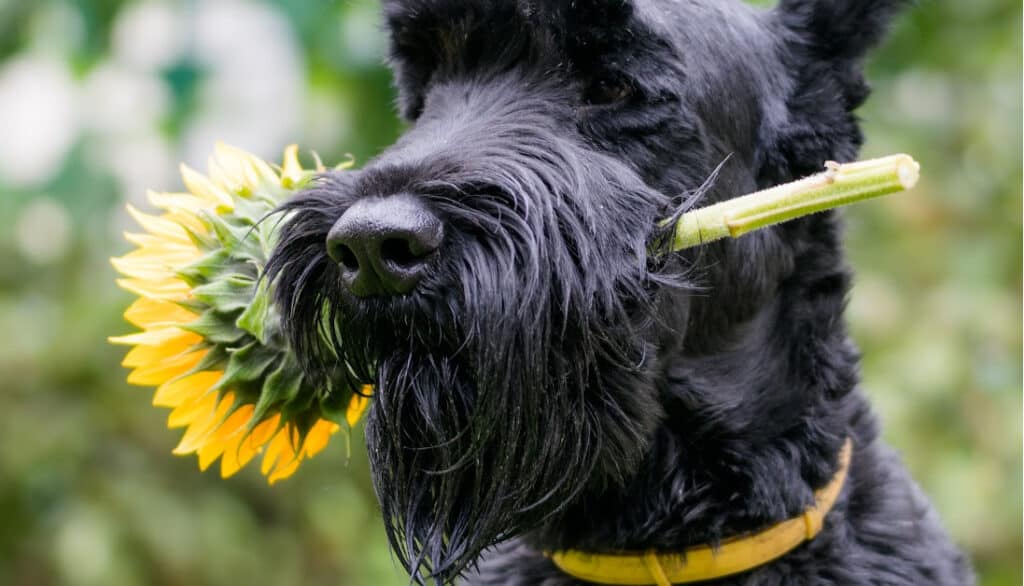
Sunflowers: Practical and Beautiful
But sunflowers aren’t just beautiful to look at. They’re practical, too. Their seeds are a nutritious snack packed with healthy fats, proteins, and various minerals. Sunflower oil, derived from these seeds, is a popular cooking ingredient globally due to its mild flavor and high smoke point.
Besides their culinary uses, sunflowers are also celebrated in the art and culture world. From the stunning masterpieces of Van Gogh to the symbolic sunflower movement in Taiwan, these luminous plants are much more than meets the eye.
We all adore the beauty of sunflowers. Yet, for those of us with dogs, a key question arises. Are these lovely flowers safe for our furry friends? As we delve deeper into this topic, let’s keep one thing in mind. Sunflowers may bring joy to us. But it’s crucial that they don’t pose a risk to our pets.
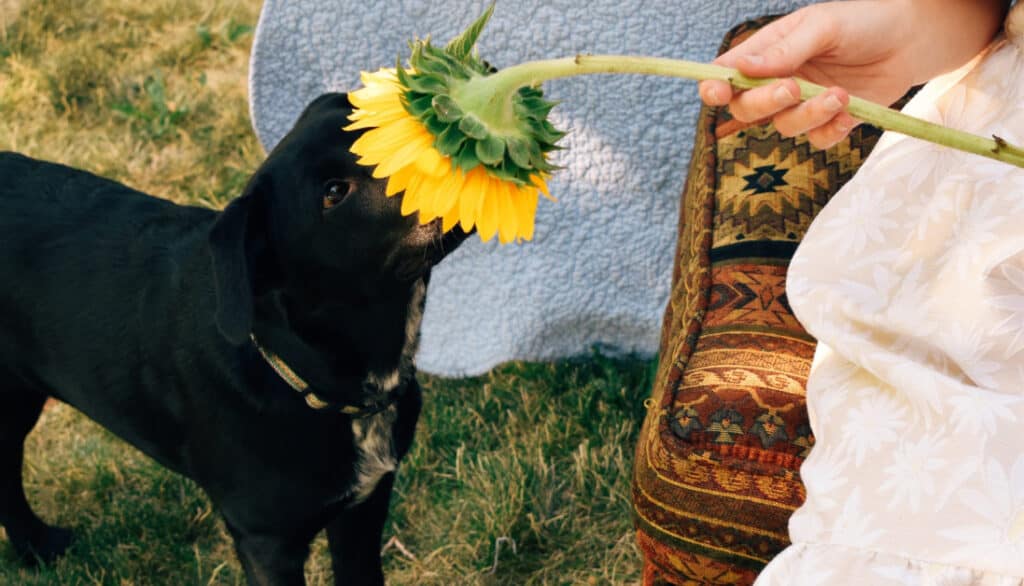
Understanding the Canine Digestive System
Before we delve into whether sunflowers and dogs mix, let’s take a moment to understand our furry friends’ unique digestive system. As any dog lover can tell you, it often seems like our canine companions will eat just about anything. But just because they can, doesn’t mean they should. To understand why, let’s take a walk – not in the park, but through the fascinating journey of food in a dog’s body.
A dog’s digestive system is designed for a carnivorous diet. The adventure begins when the dog takes a bite of food. Unlike us humans, dogs aren’t big on chewing. Those sharp, pointy canine teeth are made for ripping and tearing food, not for breaking it down into smaller pieces.
Once swallowed, the food heads down the esophagus and into the stomach. Here, powerful stomach acids and enzymes begin breaking down the food, particularly proteins. This is one of the areas where dogs and humans differ significantly. A dog’s stomach has a highly acidic environment, which allows for more efficient breakdown of raw meats and even bone.
The partially digested food then moves into the small intestine, where the magic of nutrient absorption happens. This is where your dog’s body takes all the good stuff – proteins, carbohydrates, fats, vitamins, and minerals – and puts it to work.
While the large intestine in dogs is shorter compared to that in humans, it plays a critical role in absorbing water and electrolytes, forming feces, and hosting a universe of beneficial bacteria.
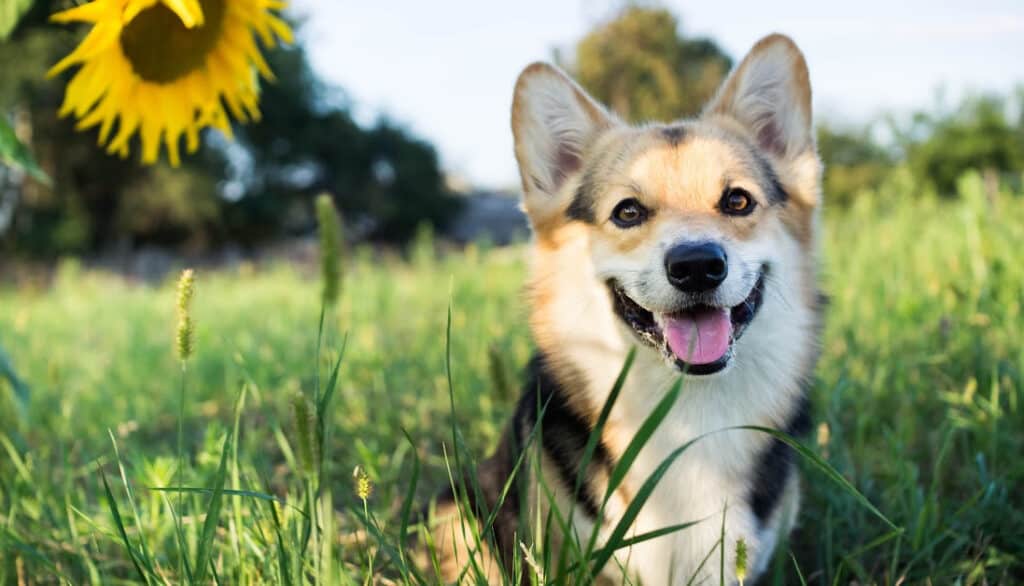
Sunflowers: Can Dogs Digest Them?
So, what does all of this mean for sunflowers and dogs? It means we need to be careful. While dogs’ digestive systems are robust and adaptable, they’re fundamentally designed for a carnivorous diet. Certain plant materials can be difficult for them to digest, and some might even contain substances that are harmful to dogs.
As we move forward to discuss the safety of sunflowers for our canine friends, keep in mind that their digestive systems, while wonderfully efficient, aren’t designed to handle everything that they might try to eat. It’s our job as pet parents to make sure what goes into our dogs is just as safe coming out. We’re ready to embark on this path of discovery, equipped with the knowledge of how our beloved pups process their food. Stay tuned as we uncover whether or not the radiant sunflowers pose a threat to them.
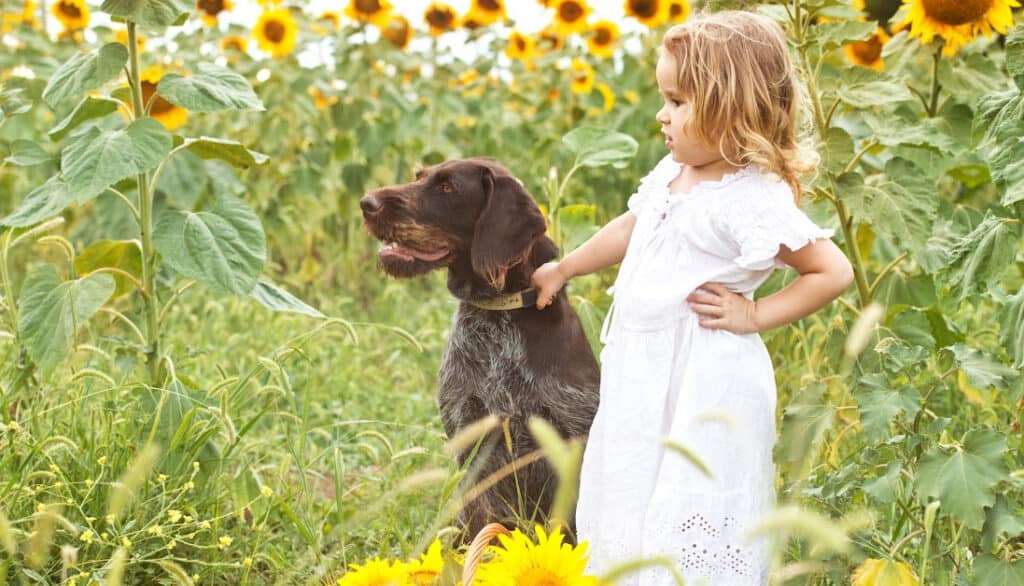
Are Sunflowers Toxic to Dogs?
Now that we have a solid understanding of our dogs’ digestive capabilities, let’s cut to the chase and answer the million-dollar question: Are sunflowers toxic to dogs?
First, a sigh of relief for all sunflower-loving dog owners out there: Sunflowers themselves are not toxic to dogs. This includes the petals, leaves, and stems. So, if you catch your furry friend sniffing or even nibbling on a sunflower in your garden, there’s no need to panic.
However, it’s essential to point out that ‘non-toxic’ doesn’t necessarily mean ‘healthy’. While the occasional exploration of a sunflower won’t harm your dog, making a meal out of them isn’t advisable. Sunflowers aren’t nutritionally beneficial for dogs. Their digestive system is primarily designed to process a carnivorous diet. Consuming too many sunflowers may lead to minor digestive discomfort, such as bloating or gas.
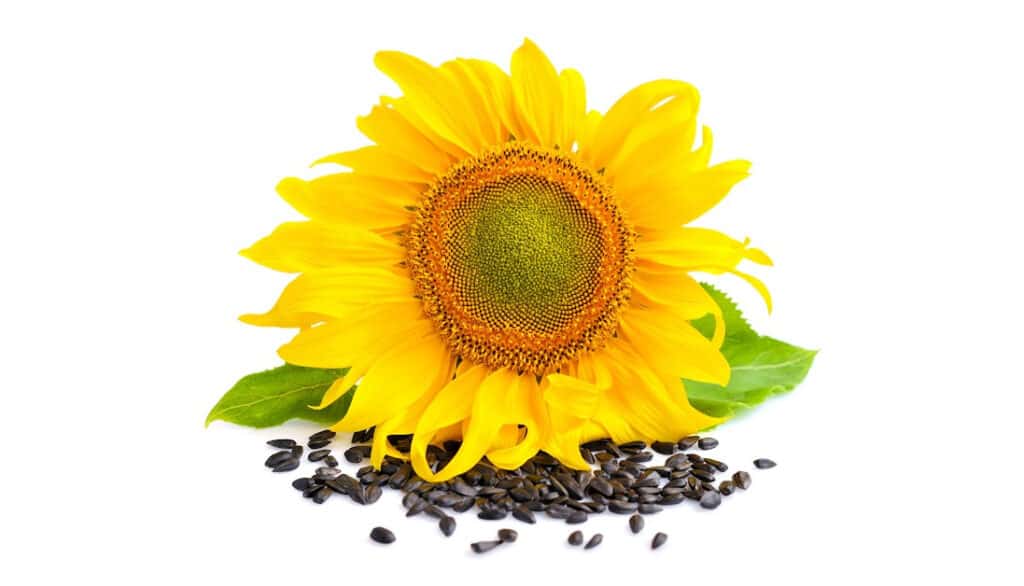
The Problem With Sunflower Seeds
The major area of concern when it comes to sunflowers and dogs isn’t the flowers themselves, but the seeds. Sunflower seeds, particularly when they’re seasoned or salted, can be problematic for dogs. While they’re not toxic per se, they can pose health risks if consumed in large quantities or without proper preparation. The high-fat content in sunflower seeds can lead to upset stomachs and, over time, can even contribute to conditions like pancreatitis.
Additionally, if your dog eats sunflower seeds whole – shell and all – it could potentially cause a blockage in their digestive tract. The shells are tough and not easily digestible, meaning they can get stuck and cause complications.
If you suspect that your dog has consumed a large number of sunflower seeds or shows signs of discomfort after ingesting parts of a sunflower, it’s always wise to consult with your vet. Symptoms to watch out for include vomiting, diarrhea, loss of appetite, abdominal pain, or lethargy.
So, the takeaway here? While sunflowers themselves are not toxic to dogs, moderation and caution are key. As we delve into the debate about sunflower seeds in the next section, we’ll explore this further. Our love for our canine companions calls for careful and informed decisions about their diet. This ensures their tails keep wagging healthily.

The Sunflower Seeds Debate
Now that we’ve discussed sunflowers’ general safety, let’s dive into the more nuanced issue of sunflower seeds. While these tiny kernels are praised for their health benefits in human diets, the case isn’t as clear-cut when it comes to our furry friends. As such, sunflower seeds have found themselves at the center of a hot debate among pet owners and veterinarians alike.
On one hand, sunflower seeds, when prepared correctly, are not toxic to dogs. They are rich in healthy fats, proteins, and an array of vitamins and minerals, including Vitamin E and B, and selenium. Some advocates argue that in moderation, and with the right preparation, sunflower seeds can be a healthy treat for dogs.
It’s vital to prepare sunflower seeds properly for dogs. Firstly, remove the shells. Dogs shouldn’t eat these as they can block their digestive system. Next, make sure the seeds are unsalted. Also, avoid adding any flavors or additives that could be harmful. Lastly, due to their high-fat content, give these seeds in small amounts. Too many could affect your dog’s weight and overall health.
On the other hand, detractors of the sunflower seeds-for-dogs idea point out several potential downsides. Despite their nutritional value, sunflower seeds aren’t necessarily an optimal source of nutrition for dogs. The nutrients they provide can be obtained through a balanced, high-quality dog diet without the potential risks that sunflower seeds carry.
Dogs can eat shelled, unsalted sunflower seeds, but only in moderation. Overeating can lead to problems like obesity and pancreatitis. Often, dogs don’t know when to stop eating something delicious. This is especially true for small foods, like sunflower seeds. They can easily overeat these.
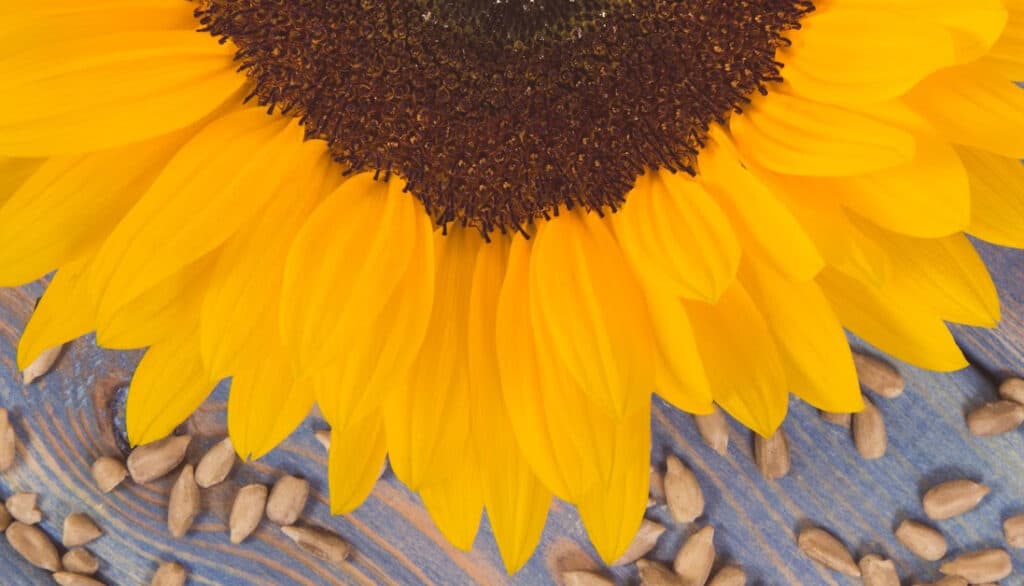
The key takeaway from this debate?
The key takeaway from this debate? As with many things in life, moderation is crucial. Sunflower seeds aren’t toxic to dogs, but they need to be prepared correctly and served in moderate amounts. As a pet parent, your first port of call should always be your vet. If you’re considering introducing sunflower seeds into your dog’s diet, discuss it with your vet first. They can provide personalized advice based on your dog’s health, weight, age, and dietary needs.
Remember, while it can be tempting to share our own foods with our furry friends, their dietary needs differ from ours. Their health and safety should always come first, even in the face of those irresistible puppy eyes pleading for a bite of what you’re eating.
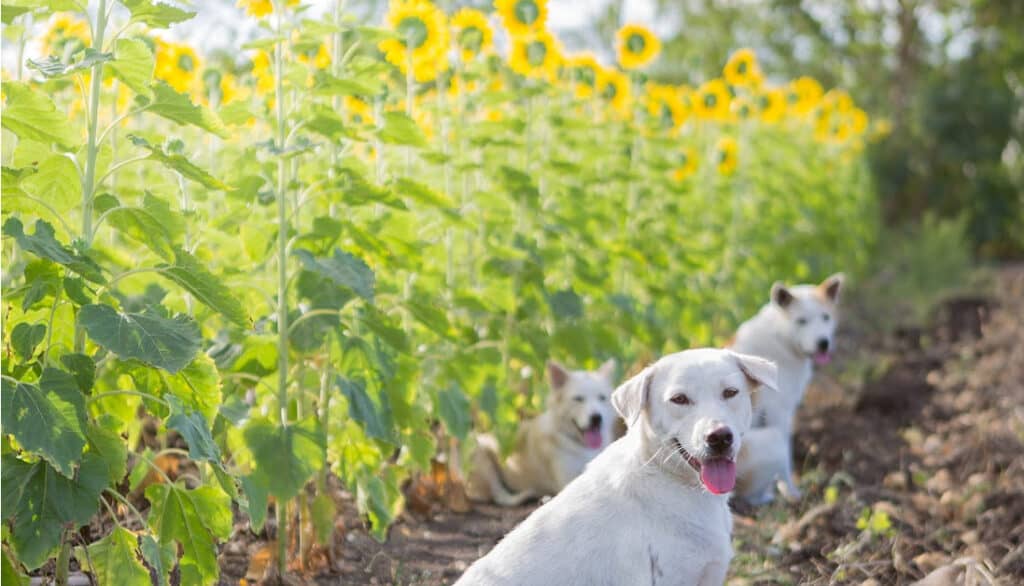
Preventive Measures for Dog Owners
As dog parents, we’d do anything in our power to ensure the safety and well-being of our furry friends. When it comes to their diet, the line between safe and harmful can sometimes blur. While we now understand that sunflowers aren’t toxic to dogs, it’s important to be proactive in maintaining our dogs’ health and avoiding potential problems. Here are some preventive measures you can adopt:
- Supervise your dogs in the garden: Dogs are naturally curious creatures and may want to explore, sniff, or even nibble on the plants they find in their environment. If you have sunflowers or other plants in your garden, always keep an eye on your dog when they’re outside.
- Keep sunflower seeds out of reach: If you eat sunflower seeds yourself, ensure they’re stored securely where your dog can’t access them. This is especially crucial for seeds that are salted or seasoned, which can be harmful to dogs.
- Train your dog: Teach your dog commands such as “leave it” or “drop it.” These can be invaluable in preventing them from eating things they shouldn’t, whether that’s sunflowers, other potentially harmful plants, or food items.
- Maintain a balanced diet: Feed your dog a high-quality, balanced dog food that meets all their nutritional needs. Treats, including sunflower seeds, should make up no more than 10% of your dog’s daily calorie intake. Consult with your vet to find out the best diet plan for your dog.
- Prompt Response: If your dog exhibits any signs of illness, such as vomiting, diarrhea, loss of appetite, or lethargy, contact your vet immediately. It’s always better to be safe than sorry when it comes to the health of our pets.
Prevention is the cornerstone of good pet parenting. We hope these measures arm you with the knowledge and tools you need to ensure your dog remains healthy and happy. The love we share with our dogs is priceless, and taking care of their dietary needs is one of the many ways we can show them how much we care.
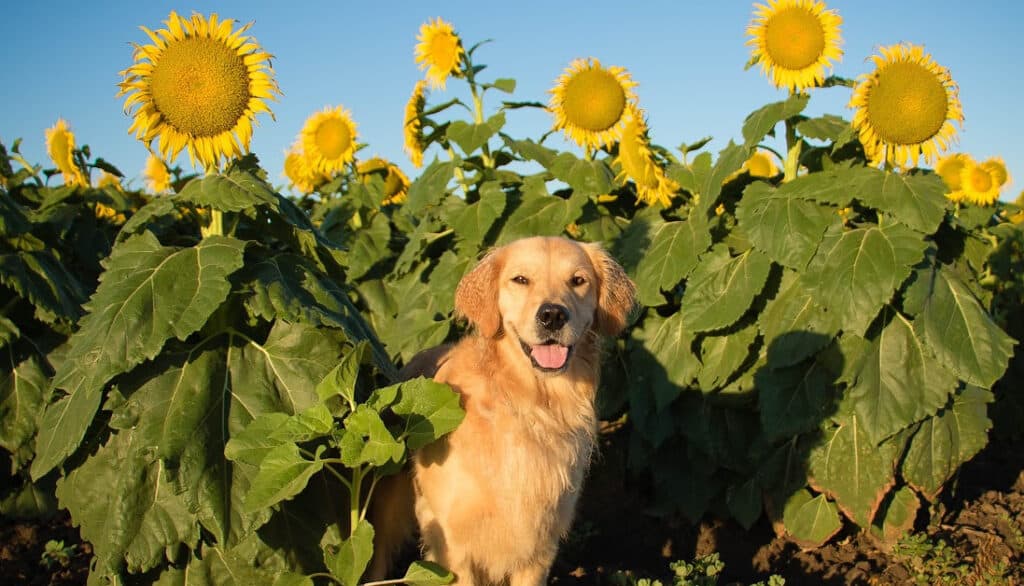
Conclusion
Navigating the world of our dogs’ dietary needs can sometimes feel like a bit of a maze. As dog owners, we always want the best for our furry companions. But with a little research, guidance from veterinary professionals, and a dose of common sense, we can ensure our pups stay healthy, happy, and wagging their tails with joy.
Sunflowers, in all their radiant glory, need not be a cause of concern for dog lovers. They are not toxic to dogs, but moderation and precaution are key. As for the sunflower seeds debate, while they aren’t a no-go, it’s essential to prepare them correctly and serve them sparingly, if at all.
Every dog is unique, and what works for one might not work for another. Always consult with your vet before introducing new elements into your dog’s diet. Remember, their main nutritional needs should be met with high-quality dog food designed for them.
In the grand scheme of dog parenting, the most vital ingredient is love. Our furry friends bring so much joy, laughter, and comfort into our lives. Ensuring they lead healthy lives is the least we can do in return. So here’s to enjoying beautiful sunflower-filled days with our dogs, with the peace of mind that they are safe and well.
Thank you for joining us on this exploration of sunflowers and dogs. We hope you’ve found it enlightening and helpful. For more insights into the world of dogs, stay tuned to our blog. Until next time, keep those tails wagging!
~Lindsie
